See also
- Intrepid was the name of the Lunar Module on Apollo 12
USS Intrepid may refer to the following ships of the United States Navy:

Richard Somers was an officer of the United States Navy, killed during an assault on Tripoli during the First Barbary War.
USS Franklin may refer to:
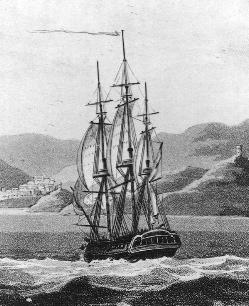
USS Philadelphia, a 1240-ton, 36-gun frigate, was the second vessel of the United States Navy to be named for the city of Philadelphia. Originally named City of Philadelphia, she was built in 1798–1799 for the United States government by residents of that city. Funding for her construction was raised by a drive that collected $100,000 in one week, in June 1798. She was designed by Josiah Fox and built by Samuel Humphreys, Nathaniel Hutton and John Delavue. Her carved work was done by William Rush of Philadelphia. She was laid down about November 14, 1798, launched on November 28, 1799, and commissioned on April 5, 1800, with Captain Stephen Decatur, Sr. in command. She was captured by Barbary pirates in Tripoli with William Bainbridge in command. Stephen Decatur led a raid that burned her down, preventing her use by the pirates.
USS Yuma has been the name of five ships of the United States Navy. The name is taken after the Yuma tribe of Arizona.
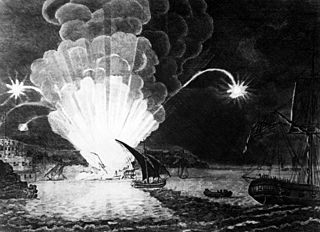
The first USS Intrepid was a captured ketch in the United States Navy during the First Barbary War.

The first USS Argus, originally named USS Merrimack, was a brig in the United States Navy commissioned in 1803. She enforced the Embargo Act of 1807 and fought in the First Barbary War – taking part in the blockade of Tripoli and the capture of Derna – and the War of 1812. During the latter conflict, she had been audaciously raiding British merchant shipping in British home waters for a month, when the heavier British Cruizer-class brig-sloopHMS Pelican intercepted her. After a sharp fight during which Argus's captain, Master Commandant William Henry Allen, was mortally wounded, Argus surrendered when the crew of Pelican were about to board.

USS Syren was a brig of the United States Navy built at Philadelphia in 1803. She served during the First Barbary War and the War of 1812 until the Royal Navy captured her in 1814. The British never commissioned her but apparently used her for a year or so as a lazaretto, or a prison vessel. She then disappears from records.

USS Wiley (DD-597), was a Fletcher-class destroyer of the United States Navy.

USS Vixen was a schooner in the United States Navy during the First Barbary War. Vixen was one of four vessels authorized by Congress on 28 February 1803. She was built at Baltimore, Maryland, in the spring of 1803; and launched on 25 June, Lieutenant John Smith in command.

The Mediterranean Squadron, also known as the Mediterranean Station, was part of the United States Navy in the 19th century that operated in the Mediterranean Sea. It was formed in response to the First and Second Barbary Wars. Between 1801 and 1818, the squadron was composed of a series of rotating squadrons. Later, squadrons were sent in the 1820s to the 1860s to suppress piracy, primarily in Greece and to engage in gunboat diplomacy. In 1865 the force was renamed the European Squadron.
USS Active may refer to the following ships of the United States Navy:
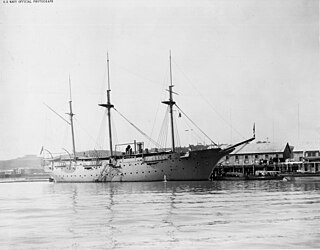
The third USS Intrepid was a steel-hulled bark in the United States Navy.
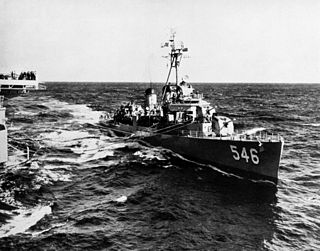
USS Brown (DD-546) was a Fletcher-class destroyer of the United States Navy, named for George Brown, a seaman on the crew of USS Intrepid during the raid that destroyed the captured USS Philadelphia in Tripoli harbor during the First Barbary War. Entering service in 1943 during World War II, the ship saw active service until 1962 when she was decommissioned and sold to Greece. Renamed Navarinon, the destroyer was active until 1981 when she was sold for scrap.

USS Wren (DD-568) was a Fletcher-class destroyer of the United States Navy.
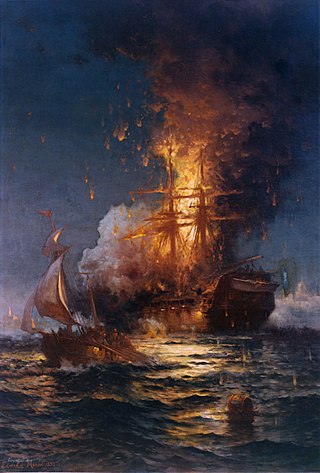
The Second Battle of Tripoli Harbor was a naval action that occurred during the American naval blockade which took place in Tripoli Harbor on July 14, 1804. The battle was part of the First Barbary War between forces of the United States and the forces of the Eyalet of Tripolitania.
Six ships and a shore establishment of the Royal Navy have been named HMS Hannibal after the Carthaginian leader Hannibal:
Eight ships of the Royal Navy have borne the name HMS Siren, Syren or Sirene, after the Sirens of Greek mythology:

Stephen Decatur Jr. was a U.S. naval officer and commodore. He was born on the eastern shore of Maryland in Worcester County. His father, Stephen Decatur Sr., was a commodore in the United States Navy who served during the American Revolution; he brought the younger Stephen into the world of ships and sailing early on. Shortly after attending college, Decatur followed in his father's footsteps and joined the U.S. Navy at age 19 as a midshipman.
Several vessels have been named Intrepid: